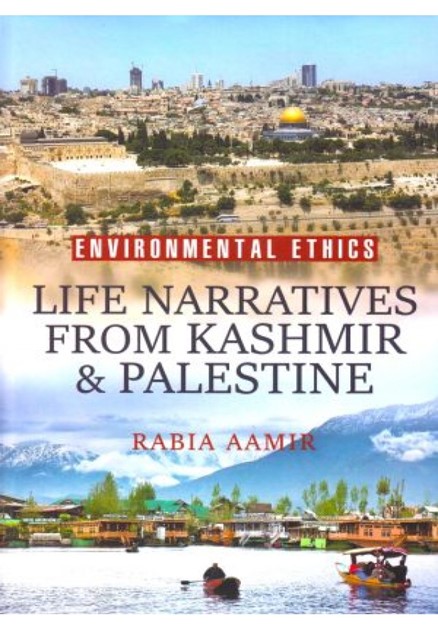Rabia Aamir’s Environmental Ethics: Life Narratives from Kashmir and Palestine emerges as a groundbreaking contribution to the realm of humanities, offering a unique exploration of environmental ethics within the complex tapestry of geopolitical conflicts in Indian-occupied Kashmir and Israeli-occupied Palestine. Aamir’s academic prowess in this work is evident as she navigates the intricate intersections of eco-politics, historical amnesia, and post/decolonial dynamics.
To gather clarity within these intersections, the author posits her work as an original and significant addition to the scholarship on Palestine and Kashmir shedding light on the historical oversights within the environmental movement. Aamir frames her investigation within the context of ongoing violence and dispossession in postcolonial states, focusing specifically on the colonies of Kashmir and Palestine. By treating personal narratives as cultural texts, Aamir engages in a nuanced exegesis that unravels contemporary imaginaries on eco-politics.
Aamir’s ability to read personal narratives as cultural texts not only provides a fresh methodological approach but also serves as a bridge between the academic and the personal. This approach allows her to humanize the environmental discourse, elevating the voices of those directly affected by the geopolitical conflicts under scrutiny.
The quoted insight from Joseph Massad adds another layer to Aamir’s exploration, prompting a critical examination of the subjective nature of the term “terrorism.” Aamir, through Massad’s lens, challenges readers to question preconceived notions and subjective perceptions surrounding terrorism, highlighting the importance of recognizing the role played by individual perspectives in shaping these definitions. Where this may seem like a holistic analysis of an otherwise globally perceived term, Aamir utilizes its disposition within the context of a disambiguated geo-political arena within the settler-colonized land of Palestine.
With this in mind, it is obvious that the heart of Aamir’s work lies in her focus on Indian-occupied Kashmir and Israeli-occupied Palestine. In the context of Kashmir, she delves into the ideological and repressive state apparatuses employed by the Indian government. Aamir’s exploration does not stop at environmental degradation but extends into the realm of human rights violations providing a holistic understanding of the multifaceted impact of geopolitical decisions.
Aamir engages with the intricate dynamics of terrorism and Islamophobia within the context of Kashmir and Palestine, unraveling the narratives that have been constructed and perpetuated by various actors: the Indian State and the Israeli Government. Her academic scrutiny brings forth a nuanced understanding of these terms, challenging prevailing discourses that often oversimplify the complex reality of the region.
Elaborating upon that further, within the context of Israeli-occupied Palestine, Aamir exposes the mechanisms of reinvasion and interpellation wielded by the Israeli state. Her academic lens allows her to dissect these geopolitical strategies, revealing their impact not only on the territorial landscape but also on the lives and identities of the Palestinian people.
In conclusion, Rabia Aamir’s Environmental Ethics stands as a testament to the power of interdisciplinary scholarship. Her meticulous exploration of environmental ethics within the geopolitical conflicts of Kashmir and Palestine, coupled with insightful quotations like that of Joseph Massad, prompts readers to engage critically with the intertwined issues of ecocide, terrorism, and identity. Aamir’s work is not just a scholarly endeavor; it’s a call to action, urging academics and policymakers alike to reconsider established narratives and address the multifaceted challenges presented by environmental ethics in conflict zones, particularly that of Indian-Occupied Kashmir and Settler-colonized Palestine.

She is an Assistant Professor of English at the Faculty of Arts & Humanities, NUML, Islamabad, a postdoc research fellow at CIGA, Istanbul Sabahattin Zaim University, Turkiye, and a former awardee of PhD Research Fellowship at the Department of English and Comparative Literature, Columbia University, New York, USA (2018-19). With a teaching experience of more than twenty years at different levels, she is an HEC Approved Supervisor and recipient of the Best University Teacher Award for the year 2021-22. With a wide range of pedagogic interests, she conducts voiceovers for documentaries, academic discussions, and conferences, and publishes in different genres of poetry and petite poetic memoirs about her times of growing up in Lahore, book chapters on Pakistani Fiction and the changed landscape of Palestine, and articles of seminal importance problematizing the idée reçues in the debates on Kashmir and Palestine. Her research domains include American/Native American literature, Post 9/11 Pakistani Fiction, Middle Eastern and Kashmiri Literature and visual literary narratives, Film Studies, life narratives, and Environmental Ethics. Her recent book Environmental Ethics: Life Narratives from Kashmir & Palestine (2023) is an epistemological theorizing to the debates of environmental humanities and decoloniality.

He is a dedicated MPhil scholar delving into the intricacies of space management and the concept of thirdspace in conflict zones, with a particular focus on the contentious region of Kashmir. Currently engaged in advanced studies, he aims to bring a nuanced perspective to the intersection of space, conflict, and human experiences. Alongside his scholarly pursuits, Ausaf serves as an IB certified Integrated Humanities teacher at Headstart International. His academic endeavors and professional commitments reflect a profound commitment to understanding and navigating the complex landscapes of conflict zones, offering valuable insights into the multifaceted dimensions of spatial restrictiveness and thirdspace in these challenging environments.

